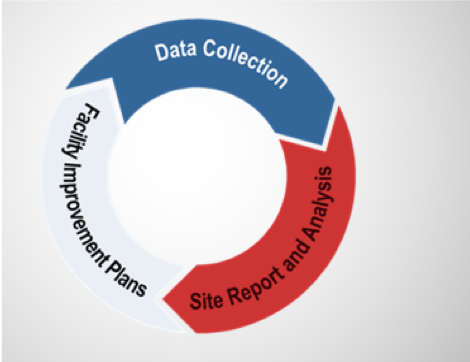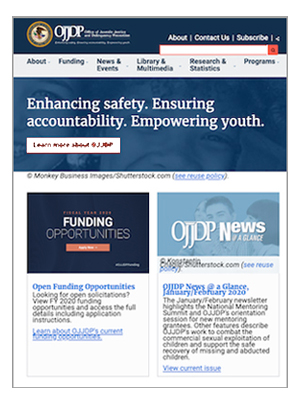The Federal Advisory Committee on Juvenile Justice (the FACJJ) held an in-person meeting on March 6, 2020, at the Office of Justice Programs in Washington, DC. OJJDP Administrator Caren Harp opened the meeting by introducing and welcoming a new FACJJ member, Russ Riehl. Mr. Riehl is Principal of Simle Middle School in Bismarck, ND, and a member of the North Dakota Governor’s Committee on Juvenile Justice.
Kim Godfrey Lovett, Executive Director of the Performance-based Standards (PbS) Learning Institute, provided an overview of PbS' data-driven approach to improving the operations, programs, and services of juvenile justice facilities and programs. PbS uses a continuous improvement model that allows participants to monitor progress on an ongoing basis. The goal is to ensure a safe and healthy environment and effective services that help young offenders return to the community and lead productive, law-abiding lives.
 PbS builds performance improvement and accountability into juvenile justice facility operations using a three-part continuous improvement cycle: (1) collecting data, (2) analyzing the performance outcomes and summary data reports, and (3) using the data to create improvement and reforms.
PbS builds performance improvement and accountability into juvenile justice facility operations using a three-part continuous improvement cycle: (1) collecting data, (2) analyzing the performance outcomes and summary data reports, and (3) using the data to create improvement and reforms.Following Ms. Godfrey Lovett's presentation, Administrator Harp and Dr. TeNeane Bradford, head of the Office's State Relations and Assistance Division, provided a brief history of the Juvenile Justice and Delinquency (JJDP) Act and the Title II Formula Grants program. Since 1974, OJJDP has administered the Formula Grants program to support state and local delinquency prevention and intervention efforts and juvenile justice system improvements and to ensure compliance with the JJDP Act's core requirements.
A major focus of discussion was the “85 percent rule,” one of the criteria by which states are deemed eligible to participate in the Formula Grants program. The rule stipulates that states must submit 12 months of compliance data for 85 percent of their facilities to be deemed eligible to participate in the applicable award year. “Recently, there have been more states deemed ineligible than in the past,” Administrator Harp said. “This has been an unintended consequence of our seriousness about implementing the Act.”
If a participating State, despite its good faith efforts, fails to demonstrate compliance with the JJDP Act's core requirements in any year, OJJDP will reduce its formula grant for the subsequent fiscal year by 20 percent for each requirement for which the State is noncompliant. States must use 50 percent of their allocations for that award period to achieve compliance.
 The FACJJ meeting's afternoon session opened with a walk-through of OJJDP's redesigned website by Web Content Manager Jill Molter. The site offers state-of-the-art global search capabilities. Visitors can search by keyword and narrow search results by type of information, such as funding, programs, events, publications, and multimedia. Many webpages allow visitors to search within the page content or use filters to find what they need. The site now ensures a successful web experience, whether visitors are accessing the site on a desktop, tablet, or mobile device.
The FACJJ meeting's afternoon session opened with a walk-through of OJJDP's redesigned website by Web Content Manager Jill Molter. The site offers state-of-the-art global search capabilities. Visitors can search by keyword and narrow search results by type of information, such as funding, programs, events, publications, and multimedia. Many webpages allow visitors to search within the page content or use filters to find what they need. The site now ensures a successful web experience, whether visitors are accessing the site on a desktop, tablet, or mobile device.
In addition, the website now features detailed information about OJJDP's work with the states and territories. The state pages focus on Title II Formula Grants funding determinations and reporting in a range of areas, including state 3-year plans, compliance information, and disproportionate minority contact. The pages also provide a listing of all active OJJDP awards for individual states and territories.
Later in the afternoon, FACJJ members identified areas of focus for the coming year. The Subcommittee on Facilitating Compliance With the Juvenile Justice Reform Act will continue to assist OJJDP with clarifying terminology and implementing the Juvenile Justice Reform Act of 2018. The Subcommittee on Educating the Field has completed its work, and a new Subcommittee on Engaging Territories and Nonparticipating States was formed. This subcommittee will focus on addressing the challenges faced by U.S. territories in carrying out the Formula Grants program. The subcommittee will also assist OJJDP in its outreach to states that are not currently participating in the Title II Formula Grants program. The Subcommittee on Special Topics is considering a number of possible focus areas, including truancy reduction efforts.
OJJDP Program Manager Keisha Kersey closed the meeting with a report on preparations for the State Relations and Assistance Division’s next National Training Conference. The conference will be held October 6–8, 2020.
The Federal Advisory Committee on Juvenile Justice is a consultative body established by the Juvenile Justice and Delinquency Prevention Act of 1974, as amended (Section 223), and is supported by OJJDP. Composed of members of state advisory groups on juvenile justice, the committee advises the President and Congress on matters related to juvenile justice, evaluates the progress and accomplishments of juvenile justice activities and projects, and advises the OJJDP Administrator on the work of OJJDP.
